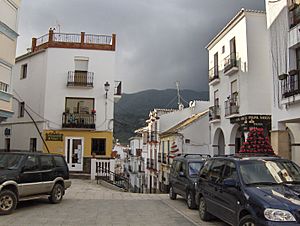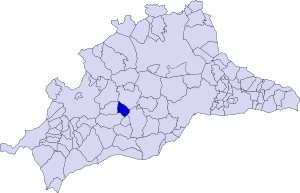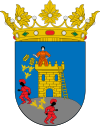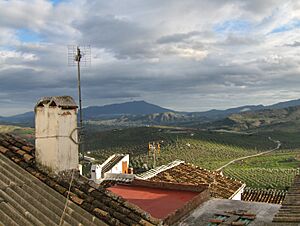Alozaina facts for kids
Quick facts for kids
Alozaina
|
|||
|---|---|---|---|
 |
|||
|
|||

Municipal location in the Province of Málaga
|
|||
| Sovereign state | |||
| Autonomous community | |||
| Province | |||
| Comarca | Sierra de las Nieves | ||
| Population
(2018)
|
|||
| • Total | 2,015 | ||
| Demonym(s) | Pecheros | ||
| Time zone | UTC+1 (CET) | ||
| • Summer (DST) | UTC+2 (CEST) | ||
| Website | http://www.alozaina.es | ||
Alozaina is a charming town and municipality in southern Spain. It's located in the province of Málaga, which is part of the Andalusia region. The town sits near the Sierra de las Nieves mountains.
Alozaina is about 52 kilometers (32 miles) from the city of Málaga. It's also 41 kilometers (25 miles) from Ronda, another famous Spanish city. Around 2,200 people live here. The town covers an area of 33.85 square kilometers (13.07 sq mi).
Alozaina is known as one of the "pueblo blancos," or white villages. These villages are famous for their whitewashed houses. Over the last ten years, Alozaina has become a lively place. It has kept its traditions while adding new features for residents and visitors. People from Alozaina are called Pecheros. Soon, a new tourist information center will open to help visitors explore the area.
Contents
A Look at Alozaina's Past
Ancient Times and Early Settlers
People have lived in the Alozaina area for a very long time. From the Upper Palaeolithic period, which was thousands of years ago, a small idol was found. This shows that humans were here even then. Later, during the Neolithic Age, there was a village with a large cemetery. Today, only a few graves remain from that time.
In a place called the "Cave of the Table," archaeologists found a burial site. They also discovered two golden trumpets from the Bronze Age. These amazing finds are now kept in the Archaeological Museum of Málaga. From the time of the Iberians and possibly the Phoenicians, tombs with decorated pottery have been found. These discoveries help us understand how ancient people lived and traded.
Roman Influence
The ancient Romans also had a presence in Alozaina. They built small settlements for travelers. These travelers would rest here on their way to important cities like Ronda (called Acinipo back then) or Cártama (Cartima). These settlements helped people move goods and travel to the sea. The people living here mostly farmed and raised animals. You can still see what was once a small cemetery on the Hill of Ardite.
The Romans left other signs of their time too. In the Albar area, a column and different altar stones were found. The Valentine area also has many Roman and Arabic ruins. Roman jars called amphorae have been discovered. These jars were likely used to trade or carry olive oil to other parts of the Roman Empire.
The Middle Ages and the Fortress
When the Muslims arrived in Spain, they built watchtowers in the area. Two important ones were in Ardite and "Aloçaina." The watchtower in Aloçaina grew into a small fortress. This fortress was the beginning of the town we know today. It also gave the town its name, Alozaina.
See also
 In Spanish: Alozaina para niños
In Spanish: Alozaina para niños
 | Madam C. J. Walker |
 | Janet Emerson Bashen |
 | Annie Turnbo Malone |
 | Maggie L. Walker |





